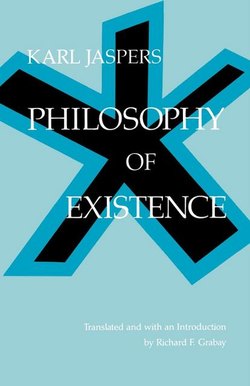Читать книгу Philosophy of Existence - Karl Jaspers - Страница 5
На сайте Литреса книга снята с продажи.
ОглавлениеEditor's Note
Philosophy of Existence by Karl Jaspers was first presented to the public thirty years ago as a series of lectures invited by The German Academy of Frankfurt. In preparing these lectures Jaspers, whom the Nazis had already dismissed from his professorship at Heidelberg, knew he was speaking in Germany for the last time—unless and until National Socialism were annihilated. Resisting temptations to easy and ineffectual martyrdom and silence, Jaspers used the occasion to offer an account of the cultural and intellectual situation from which existentialism emerged as well as a summary of his own philosophy. “In this total threat,” Jaspers writes, “I tried to pay homage to reason, to be bound to the sciences, to become aware of what was essential, and to think in the ground of all being.” In so doing Jaspers prepared lectures that spoke directly and tellingly to his hearers. And because he did not allow the historical events of 1937 to determine the contents of his lectures, they also speak with undiminished directness and force to us.
Philosophy of Existence serves three purposes today; it brings the many strands of the existential movement into focus; it provides an excellent overview of Jaspers'own philosophical position, which is becoming increasingly available to English and American readers as more of his books are translated; and it demonstrates by example that philosophy need not be irrational, anti-scientific, journalistic, or homiletic in order to be existential and engagé.
In this short book Jaspers, one of our leading existentialist philosophers, provides a much needed corrective for the popular view of existentialism as a pessimistic, irrationalist philosophy. Jaspers maintains that it is, rather, part of the mainstream of Western philosophy—the form that philosophy has taken in our day. Since Socrates proclaimed the virtue of the examined life, the task of philosophy has been to give a reflective account of human existence, to clarify and illuminate human life. It has done this both by critical inquiries into many areas of human experience, and by constructing ontological accounts of reality. In the former effort philosophy has developed such specialties as logic, ethics, epistemology, philosophies of religion, science, mind, value, art, and so forth. In the latter it has attempted to draw its results into a vision of the totality of being. Jaspers continues this two-fold philosophical task by rational and critical methods. He insists that philosophy cannot be irrational since its only tool is reason and that it cannot be the expression of a merely subjective and particular viewpoint since it must be intelligible and communicable to others.
But philosophy must be concerned with man in his concrete physical, historical, social, and personal situation. It cannot or should not reduce human existence to one or even several of its dimensions. Jaspers argues that in the nineteenth and twentieth centuries this is precisely what philosophy has done: it has departed from its vital aim and tried to imitate rather than clarify or explain the sciences. It has theorized about man as though he were an object in the world like other things, an object to be understood by the same kind of detached and objective investigation. Existentialism is a reaction against pseudoscientific philosophizing, and the term “existential” (Existenz) focuses this reaction by calling our attention to the concrete human situation from which philosophical thought arises.
The two philosophers from whom Jaspers has learned the most are Kierkegaard and Kant. From the former comes Jaspers'sensitivity to man's concreteness and individuality. From the latter comes Jaspers'respect for science, his method, and his view of reason as the principle of both criticism and unity. These influences are woven by Jaspers into an account of science, religion, metaphysics, knowledge and truth—an account which tries to do justice to the concreteness, individuality, and finitude of human existence. The result is a philosophy that is critical and rational while also open to the possibilities, inscrutabilities, and freedom of human life.
Philosophy of Existence, I believe, is the finest introduction to Jaspers' own comprehensive philosophy and to existentialism as a philosophical movement.
JOHN R. SILBER
Austin, Texas August, 1970
